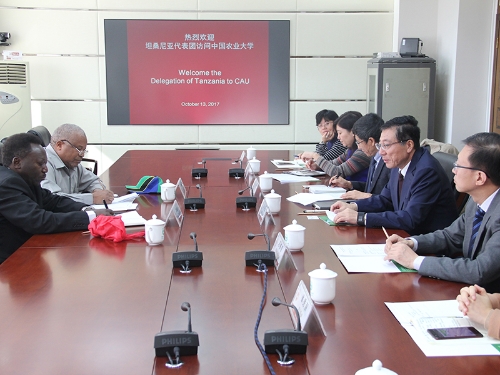
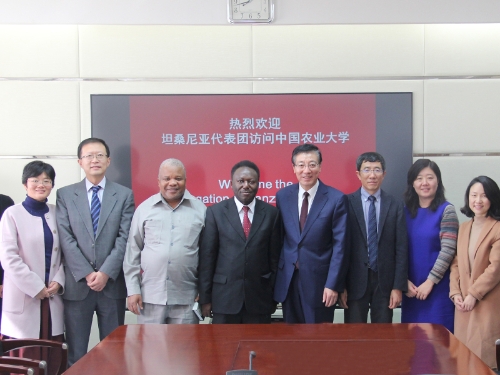
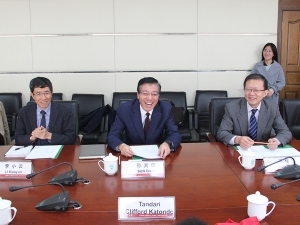
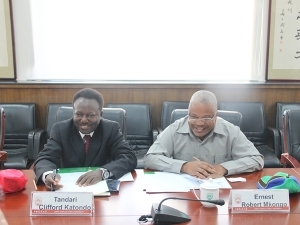
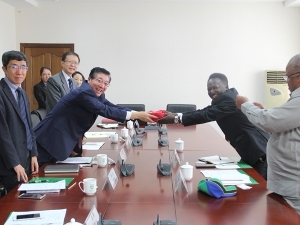
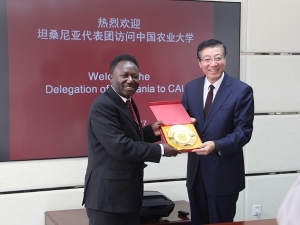
On October 13th, the governor and deputy governor of Tanzania’s Morogoro Province, Clifford Katondo Tandari and Ernest Robert Mkongo visited China Agricultural University (CAU). Sun Qixin, president of China Agricultural University greeted the guests on CAU East Campus. Two sides exchanged views here on topics including the mechanism of agricultural technology generalization. Representatives of the team led by Professor Li Xiaoyun, Office of International Relations, and the College of Humanities and Development also attended the meeting.
On behalf of CAU, President Sun Qixin extended his warm welcome towards Governor Tandari and his delegation. He stated that CAU is a leading university in China’s agriculture with century-old history. The school shoulders responsibilities for promoting agricultural science and technology innovation, and implementing targeted poverty alleviation. In recent years, CAU has made important contribution to national agriculture development, covering agricultural production growth, development and utilization of agricultural resources, food security and safety, agricultural modernization, agricultural engineering and rural and regional development. As Tanzania is China’s good partner and friend, he expressed great pleasure for CAU committed to strengthening Sino-Tanzanian relationship.
With the help of China’s Ministry of Science and Technology, Joint Project for Sino-Tanzanian Agricultural Development Research Center carried out by CAU and Sokoine University of Agriculture (SUA) goes well. Professors from both sides in agronomy, animal husbandry and resources and environmental science have exchanged visits. About 10 teachers from SUA have received short-term training and long-term education for academic degree in CAU. Over the past years, CAU has sent delegations to Tanzania and has been greeted by former Tanzanian president and prime minister many times, forging close ties with Tanzanian central ministries, local governments, universities and Chinese Embassy in Tanzania. Cooperative researches and practices conducted here also have enjoyed enormous recognition and positive praise.
President Sun Qixin added that CAU would continue to support Tanzanian projects. In addition, CAU is looking forward to cooperating with SUA in multiple aspects, translating science and technology and knowledge into productivity as effective, thus making significant contribution to Tanzania’s economic and social development and poverty alleviation.
Governor Katondo spoke highly of the science and technology popularization conducted by CAU in Morogoro, and extended his gratitude for CAU’s help. He said they were pleased to see outcomes worked by CAU in Tanzania’s food safety and output (especially maize’s) and technical trainings for local peasants. Backed by CAU’s technical support, Tanzanian peasants have produced more maize and led a better life. Morogoro government has decided to increase the number of villages promoting poverty alleviation from two to ten. He also extended an invitation to President Sun Qixin.
After the meeting, the two sides exchanged presents.
During the visitation, Governor Katondo also had the opportunity to visit Xiaoyun Poverty Reduction Center in Hebian village in Mengla county of Yunnan Province, and draw on development and poverty reduction experience in China’s rural areas. Governor Katondo engaged in in-depth conversations with Tanzania study group of the College of Humanities and Development for further work plans.
Extended reading
In July, 2017, Tanzania County-level Poverty Reduction Center was set up, which marked the establishment of the first county-level poverty reduction learning center by China in Africa. The construction project was launched by International Poverty Reduction Center in China (IPRCC) and President’s Office Planning Commission (POPC), and is carried out by CAU Professor Li Xiaoyun and his research team. The project aims at providing useful know-how for rural poverty reduction in Tanzania.
Comprehensive technical support and participation by Li Xiaoyun and his team have increased local crop output by 2 to 3 times per peasant. The project is gaining momentum at the moment with another center set up and more centers in the plan. In addition, as the teaching and training and scientific-research base, villages where centers located receive undergraduates, postgraduates, teachers and researchers from CAU every year.
 Date:2018-12-14 View:
Date:2018-12-14 View:





